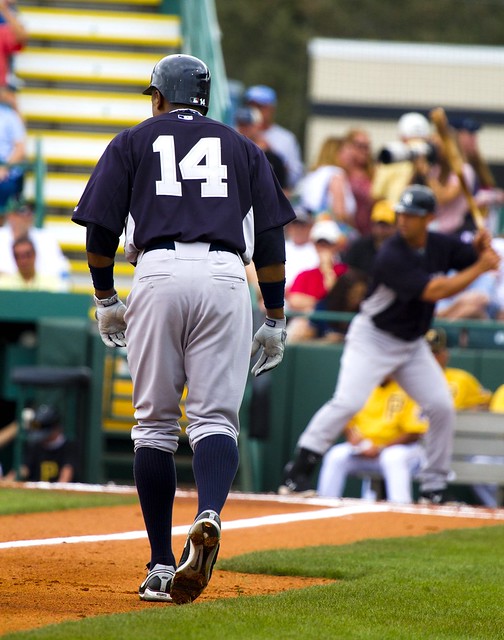by
Alex Belth |
February 28, 2011 10:47 am |
1 Comment

Eliot Asinof is most famous for writing “Eight Men Out.” (He is less famous for once being married to Marlon Brando’s sister.) Asinof played minor league ball in the Phillies system for three years before World War II. His first book, a novel about a minor league lifer, “Man on Spikes” was published in 1955 and to my mind is one of the best baseball novels. It is a hard, gripping portrait of baseball under the reserve system (none other than Marvin Miller wrote the foreword for the most recent edition of the book). The prose is plain and clear, the details are vivid and Asinof displayed considerable skill as a dramatist.

If you’ve never read it, pick up a copy when you can. It’s well worth it. Here is an excerpt, from a chapter about an old ballplayer named Herman Cruller:
And now, before the umpire hollered “Play ball!” for the last time that season, Herman felt deflated. He could not look forward to the tension and excitement of the game. The crowd was there, sweltering even in the shade of the stands behind him, pressing the players with their boisterous presence. Even the bleachers, where the Negroes sat blistering under the naked sun, were full and demanding. They were all there, defying the heat, for this was “the big one,” the game that decided and ended a season of games.
Herman looked up into the stands and watched people fanning themselves with their programs, their throats already parched from rasping calls but soon to be lubricated by long draughts of cold beer. For years he had listened to their routine, opinionated braying during the practice hours, the little pieces of stupidity from the big blaring voices. Sullenly, he watched them hollering their pre-game nonsense: “Lefty Moss stinks. He couldn’t even strike out my Aunt Mabel, and she’s ninety-one!” “I’ll bet ya a ten-spot he goes the route, horseface; I’ll bet ya another ten-spot he wins it too!” “Aah, hell. Gowann.” Thinking with their brains in their asses like a bunch of children betting their hard-earned money as if they knew what they were talking about. For all the years he had played professional baseball, for as far back as he could remember, he hated the loud ones in the crowds who had watched him those thousands of innings. He hated them for their fickleness, their blaring derision, their hooting and squawking, the sadistic way they kicked at the guy who was down. He hated the phony effort at what they called sportsmanship, the brief moment of applause that supposedly justified the hours of razzing they had really come to revel in. It was as if the ballplayers were not playing a game they could watch and enjoy, but were caricatures representing objects of love and hate, were either heroes or villains. And if they had love for a player, still they were quick to jeer at him when he booted one or fanned with a crucial run on base. They seldom considered the player a human being, capable of error as well as competence. Their money was their admission to the arena, and it gave them rights unlimited. For half a buck they could scream and jeer and sound off with their cruddy opinions as if they were speaking gospel. When they felt like it, they unleashed their venom against a ballplayer who displeased them until their scorn itself was part of their picture of him. He was a bum in their eyes, and he had to battle against them with as great a power as he did against the legitimate opposition on the field. When the crowd was down on a kid, the odds were you could count him out, for he was hitting with a pair of strikes against him and the rattling of catcalls in his ears.
He had seen the whims of a crowd make a goat out of more than one good ballplayer and then ride him right out of the league.
But it was the crowd who paid him for his stinking forty bucks a week, fair weather and foul. If he forgot, the management was right there to remind him. Baseball was a big game, and all kinds of people came to watch it for all kinds of reasons. He was paid to play for them all.
But the afternoon was hot and he was tired, and the game was a chore. It wasn’t in him to please this crowd.
You’re bitter, Herm, he told himself finally. You’re bitter and beat by the heat. You’re old and tired and near the end of the stinking line in this game, and you’re taking it out on a bunch of people no different from yourself. Give yourself another year or two and you’ll be paying your dough to sit up there and guzzle beer with the rest of them.
[Photo Credit: Old Film]























